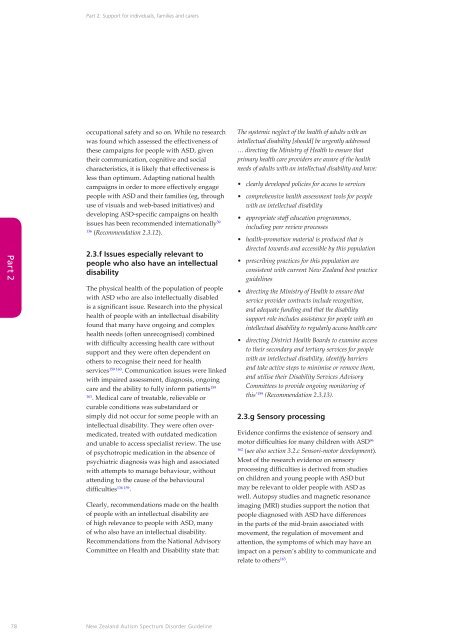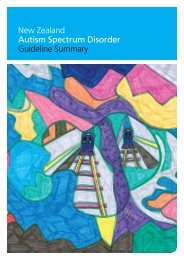New Zealand Autism Spectrum Disorder Guideline - Ministry of Health
New Zealand Autism Spectrum Disorder Guideline - Ministry of Health
New Zealand Autism Spectrum Disorder Guideline - Ministry of Health
You also want an ePaper? Increase the reach of your titles
YUMPU automatically turns print PDFs into web optimized ePapers that Google loves.
Part 2: Support for individuals, families and carers<br />
Part 2<br />
occupational safety and so on. While no research<br />
was found which assessed the effectiveness <strong>of</strong><br />
these campaigns for people with ASD, given<br />
their communication, cognitive and social<br />
characteristics, it is likely that effectiveness is<br />
less than optimum. Adapting national health<br />
campaigns in order to more effectively engage<br />
people with ASD and their families (eg, through<br />
use <strong>of</strong> visuals and web-based initiatives) and<br />
developing ASD-specific campaigns on health<br />
issues has been recommended internationally 39<br />
136<br />
(Recommendation 2.3.12).<br />
2.3.f Issues especially relevant to<br />
people who also have an intellectual<br />
disability<br />
The physical health <strong>of</strong> the population <strong>of</strong> people<br />
with ASD who are also intellectually disabled<br />
is a significant issue. Research into the physical<br />
health <strong>of</strong> people with an intellectual disability<br />
found that many have ongoing and complex<br />
health needs (<strong>of</strong>ten unrecognised) combined<br />
with difficulty accessing health care without<br />
support and they were <strong>of</strong>ten dependent on<br />
others to recognise their need for health<br />
services 159 160 . Communication issues were linked<br />
with impaired assessment, diagnosis, ongoing<br />
care and the ability to fully inform patients 159<br />
161<br />
. Medical care <strong>of</strong> treatable, relievable or<br />
curable conditions was substandard or<br />
simply did not occur for some people with an<br />
intellectual disability. They were <strong>of</strong>ten overmedicated,<br />
treated with outdated medication<br />
and unable to access specialist review. The use<br />
<strong>of</strong> psychotropic medication in the absence <strong>of</strong><br />
psychiatric diagnosis was high and associated<br />
with attempts to manage behaviour, without<br />
attending to the cause <strong>of</strong> the behavioural<br />
difficulties 136 159 .<br />
Clearly, recommendations made on the health<br />
<strong>of</strong> people with an intellectual disability are<br />
<strong>of</strong> high relevance to people with ASD, many<br />
<strong>of</strong> who also have an intellectual disability.<br />
Recommendations from the National Advisory<br />
Committee on <strong>Health</strong> and Disability state that:<br />
The systemic neglect <strong>of</strong> the health <strong>of</strong> adults with an<br />
intellectual disability [should] be urgently addressed<br />
… directing the <strong>Ministry</strong> <strong>of</strong> <strong>Health</strong> to ensure that<br />
primary health care providers are aware <strong>of</strong> the health<br />
needs <strong>of</strong> adults with an intellectual disability and have:<br />
• clearly developed policies for access to services<br />
• comprehensive health assessment tools for people<br />
with an intellectual disability<br />
• appropriate staff education programmes,<br />
including peer review processes<br />
• health-promotion material is produced that is<br />
directed towards and accessible by this population<br />
• prescribing practices for this population are<br />
consistent with current <strong>New</strong> <strong>Zealand</strong> best practice<br />
guidelines<br />
• directing the <strong>Ministry</strong> <strong>of</strong> <strong>Health</strong> to ensure that<br />
service provider contracts include recognition,<br />
and adequate funding and that the disability<br />
support role includes assistance for people with an<br />
intellectual disability to regularly access health care<br />
• directing District <strong>Health</strong> Boards to examine access<br />
to their secondary and tertiary services for people<br />
with an intellectual disability, identify barriers<br />
and take active steps to minimise or remove them,<br />
and utilise their Disability Services Advisory<br />
Committees to provide ongoing monitoring <strong>of</strong><br />
this’ 159 (Recommendation 2.3.13).<br />
2.3.g Sensory processing<br />
Evidence confirms the existence <strong>of</strong> sensory and<br />
motor difficulties for many children with ASD 96<br />
162<br />
(see also section 3.2.c Sensori-motor development).<br />
Most <strong>of</strong> the research evidence on sensory<br />
processing difficulties is derived from studies<br />
on children and young people with ASD but<br />
may be relevant to older people with ASD as<br />
well. Autopsy studies and magnetic resonance<br />
imaging (MRI) studies support the notion that<br />
people diagnosed with ASD have differences<br />
in the parts <strong>of</strong> the mid-brain associated with<br />
movement, the regulation <strong>of</strong> movement and<br />
attention, the symptoms <strong>of</strong> which may have an<br />
impact on a person’s ability to communicate and<br />
relate to others 163 .<br />
78<br />
<strong>New</strong> <strong>Zealand</strong> <strong>Autism</strong> <strong>Spectrum</strong> <strong>Disorder</strong> <strong>Guideline</strong>











